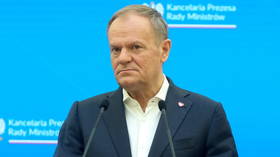German-language news agencies to ‘push back’ gendered language – but fail to make a gender-neutral policy announcement

Eight major producers of German-language news content are to use a bag of linguistic tricks to make their products more gender-neutral. Critics view the policy change as ridiculous catering to identity politics.
Like some other languages, German genders words and uses so-called generic masculine – the plural form for groups of individuals or items that are masculine by default. It’s similar to how, in English, for example, a group of US House representatives of either gender would until recently have been referred to as ‘congressmen’, but much more prevalent. Some argue that male-tilted language like this fosters the discrimination of women and non-binary people, and have been pushing for wider use of gender-neutral terms.
Also on rt.com Amid crises and pandemic, Pelosi chooses to focus on new Congress rules that ELIMINATE ‘gendered terms’This week, they can celebrate a victory, after eight major news agencies writing in German decided to partially grant their wishes. The goal is to produce news with “more sensibility to discrimination” and gradually “push back” against gendered language, according to a statement released on Monday.
The policy change was adopted by the international outlets Associated France Press (AFP) and Reuters, Germany’s DPA, Austria’s APA, Switzerland’s Keystone-SDA as well as the German sports news agency SID, Catholic news agency KNA and Evangelical news agency EPD. Many German-language outlets are subscribed to their services, so the ripple effect is likely to spread across the news industry.
The agencies will use various linguistic tricks to make their news sound less masculine, such as putting two gendered forms side by side with the feminine in front (‘Schülerinnen und Schüler’ – ‘[female] pupils and [male] pupils’) or replacing gendered words with gender-neutral phrases (‘those who smoke’ instead of ‘[male] smokers’).
Also on rt.com 'Breast milk' is now 'human milk': UK hospital trust adopts gender-neutral language in MATERNITY unit to fight 'health inequality'However, they stopped short of adopting a more radical change, the so-called “gender star”, which requires putting a special character such as an asterisk or a colon before the feminine ending of a word – for example, ‘Schüler*innen’.
Gendered language is a hot-button issue in the German-speaking world. Opponents say the proposed changes are making the language clunky, awkward to pronounce, and ugly to read. They believe the proponents want to artificially force progress in the name of an ideology, rather than allow German to evolve naturally.
The reaction to the announcement from the news agencies was understandably full of mockery. Froben Homburger, the head of DPA, was lampooned on Twitter for failing to stick to the new rules even while announcing them. He used the masculine word ‘Medienkunden’ to explain that he and his colleagues would closely monitor their subscribers’ reaction to the changes. “Medienkunden and Medienkundinnen, please!” one of the responses was.
Also on rt.com So, your Landlord is now your… Owner? UN-backed list of ‘gender-neutral’ terms met with brutal mockeryGender-neutral language is not a particularly popular idea even among the intended beneficiaries. A recent opinion poll in Germany showed that 65% of the public rejected the proposal – up from 56% last year. Even among voters who supported the Green Party, a champion of the reform, a narrow majority was against it. Those who favor them accuse conservative naysayers of defending the patriarchy.
Like this story? Share it with a friend!














